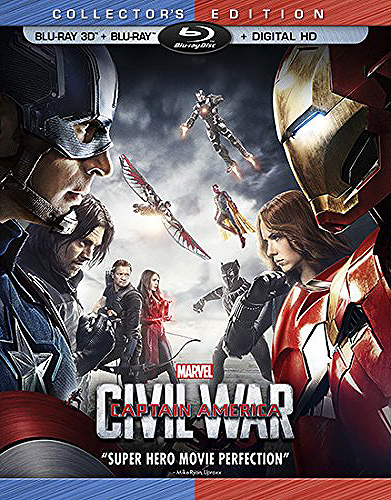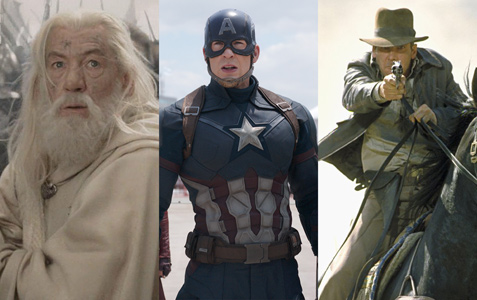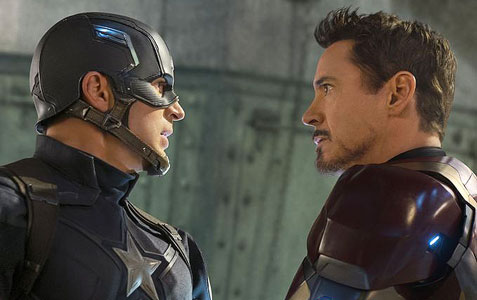Blu Tuesday: Captain America: Civil War and More
Posted by Jason Zingale (09/13/2016 @ 9:09 am)
Every Tuesday, I review the newest Blu-ray releases and let you know whether they’re worth buying, renting or skipping, along with a breakdown of the included extras. If you see something you like, click on the cover art to purchase the Blu-ray from Amazon, and be sure to share each week’s column on social media with your friends.
“Captain America: Civil War”

WHAT: After a mission to retrieve a biological weapon in Nigeria results in collateral damage, the United Nations proposes a law to regulate the Avengers, which creates a rift among the team’s members. So when his old friend Bucky (Sebastian Stan) is framed for a terrorist attack, Captain America (Chris Evans) goes rogue in order to protect him, leaving Tony Stark (Robert Downey Jr.) no other choice but to hunt them both down.
WHY: “Civil War” has been jokingly referred to as “Avengers 2.5,” and for good reason, because while the movie may be a Captain America sequel in name, it’s a continuation of several different story threads from “Winter Soldier,” “Age of Ultron” and more. Though the film feels a bit crowded at times with all of the various characters and cameos (including the introduction of Black Panther and Spider-Man), they never overshadow the central conflict. Unlike “Batman v Superman,” “Civil War” actually gives its characters a reason for fighting, and that goes a long way in legitimizing the ideological and physical clash between its opposing heroes. The movie isn’t perfect – Daniel Brühl’s villainous Zemo is underserved, and the filmmakers ignore a key argument in favor of the anti-registration side – but it does such a good job of balancing the emotionally-charged narrative with some excellent action sequences and fan service that those flaws seem trivial in comparison. “Civil War” is perhaps Marvel’s darkest and most mature film to date, but it still knows how to have fun, and that’s paramount to its success.
EXTRAS: In addition to an audio commentary by directors Anthony and Joe Russo, there’s a two-part making-of featurette, a look at Captain America and Iron Man’s respective journeys across the MCU, deleted scenes, a gag reel and an exclusive sneak peek at “Doctor Strange.”
FINAL VERDICT: BUY
Read the rest of this entry »
Third Time’s the Charm: The best threequels in cinema
Posted by Rob Dean (07/15/2016 @ 10:06 am)

The third entry in a film franchise can often be a real lull in the series that barely extends a reason for it to continue. However, there are more than a few examples of great Part Threes (or threequels, if you’ll allow the portmanteau) in cinema where they not only justify their existence but stand alone as great and entertaining films in their own right. Some of them are wrapping up trilogies (or impromptu trilogies), while others give the series a resurgence of energy and importance, but they all deliver the goods when people could have easily just gone on autopilot. As audiences prepare to see what type of movie “Star Trek Beyond” will be, here are the top ten best threequels in film.
Read the rest of this entry »
Posted in: Entertainment, Movies
Tags: Army of Darkness, best threequels, Captain America: Civil War, Harry Potter and the Prisoner of Azkaban, Indiana Jones and the Last Crusade, Iron Man 3, The Lord of the Rings, Third Time's the Charm, threequels, Toy Story 3
Movie Review: “Captain America: Civil War”
Posted by David Medsker (05/05/2016 @ 10:00 am)
Chris Evans, Robert Downey Jr., Scarlett Johansson, Sebastian Stan, Anthony Mackie, Chadwick Boseman, Daniel Brühl, Elizabeth Olsen, Paul Bettany, Don Cheadle, Emily VanCamp
Anthony & Joe Russo
By all rights, Captain America should be the lamest, worst Avenger. He came of age decades before the topic of segregation was even entertained. Rock & roll hadn’t been invented yet. If Steve Rogers is a real person, he’s likely a racist crank, yelling at the other Avengers to get off his lawn.
Thankfully, the Cap in the Marvel Cinematic Universe is none of those things. Steve Rogers is an open-minded skeptic, for whom Japanese internment camps are still a recent event. (It is not a coincidence that the word ‘internment’ is used in a crucial scene here.) He is mistrustful of the government — and who can blame him, after the events of “Captain America: The Winter Soldier” – and therefore loath to see the country he loves overstep its bounds a second time. This makes him a perfect foil for Iron Man/Tony Stark, a man whose genius is eclipsed only by his ego, and for whom reparations and accountability make sense, as long as everyone else pitches in to help him pay his bar tab.
This is the crux of “Captain America: Civil War.” The plot is more streamlined than the ’70s-era, conspiracy-minded “Winter Soldier,” but there are still some unsettling themes at play here, chief among them the concepts of freedom and safety, and the fear of compromising one for the other. The comics on which this film is based were written 10 years ago, presumably to point a finger at the George W. Bush administration for overreaching in terms of surveillance. Sadly, they’re even more prescient now.
Read the rest of this entry »
The Versus Problem: Why we love watching our superheroes fight each other
Posted by Rob Dean (04/19/2016 @ 12:00 pm)

“Who would win in a fight…?”
It’s the way millions of playground discussions begin, and have for decades. Pitting one character against another is a great pastime for nerds of all types, weighing the pros and cons of each before being forced to come to a decision on which one would emerge victorious. But recently it has crossed over from idle banter and comic book events into the mainstream with Hollywood getting in on the fun. Two new blockbusters, “Batman v Superman: Dawn of Justice” and “Captain America: Civil War,” both have heroes fighting heroes as the centerpiece of their plots (and marketing). But what is it about pitting the good guys against each other that is so compelling to audiences? Why is this story such an interesting hook that it has been used by comic book companies for years and has now bled into their cinematic counterparts?
Part of it is an innate need in many to rank items – particularly those of a nerdier set, of which I count myself. Consider the popularity of top ten listicles, various award ceremonies, championships or March Madness; these are all ways for people to determine what is “the best” in any given facet of life. It’s an extension of those playground discussions, wanting to place an order (however arbitrary) on a subjective element and come up with something that resembles an empirical and objective judgment on that element. Is the Best Film winner at the Oscars really the best film of that year? Of course not, but it lends credence to one’s devotion if a film you love is recognized by many to be great.
Read the rest of this entry »














